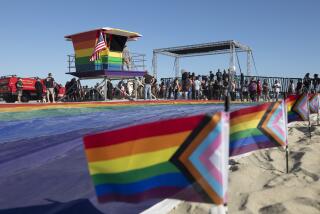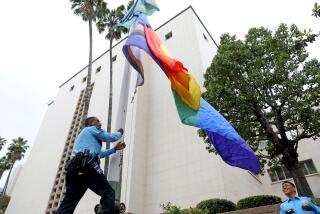Flag Salute Issue Still Burning at Saddleback
- Share via
MISSION VIEJO — As a soldier in the National Guard, Jeff Haskell marches to the beat of a military drummer.
But as student body president at Saddleback College, the 26-year-old Aliso Viejo man marches to his own beat--and as a result is taking fire from university officials and residents who question his leadership and patriotism.
At issue is whether student council meetings should begin with a recitation of the Pledge of Allegiance--an act that Haskell opposes. A school tradition for more than 20 years, the practice was halted in January 1995 under Haskell’s predecessor, who argued the pledge was insensitive to minority groups, atheists and foreign students.
“The pledge states that we have freedom and justice for all,” said Haskell, a white student who served two years in the Army before transferring to the National Guard. “But when we look critically at our society and we look at how we’ve treated minorities, it’s not true.”
In addition to alienating atheists and agnostics with the phrase “under God,” Haskell asserts the pledge’s reference to “liberty and justice for all” is hypocritical in view of American history. Haskell praises the American ideal for justice, but says until it is achieved--as he believes the pledge asserts--the flag salute should not be officially recognized.
“This country actively keeps people of ethnicity in certain lower positions and then blames them for everything from health problems to welfare problems,” said Haskell, whose stand has made him the target of several bomb threats and hate mail. “I think we want to have liberty and justice for all, but I don’t think we do.”
Without the legal means to compel student leaders to reinstate the pledge, the Board of Trustees resorted to publicly decrying the decision last year. But last month, the trustees ratcheted up pressure on Haskell by unanimously passing a resolution urging campus governing bodies to say the pledge.
“This whole issue goes right to the heart of patriotism,” said Trustee John S. Williams, 44, who spearheaded the resolution. “The students should embrace symbols of freedom like the pledge.”
Williams is particularly rankled by Haskell’s resistance, considering his military background.
“I think especially in the military you need to have unquestioned loyalty to your country,” said Williams, who recently retired as an Orange County marshal after 22 years. “I think he should be the one leading the salute to the flag.”
The trustees’ action has drawn applause from dozens of residents and war veterans such as George Key, the great-grandson of Francis Scott Key. The 71-year-old San Clemente resident told trustees’ before their vote that American soldiers have given their lives for the famed flag salute--a staple of most school board and city council meetings across the country.
Even Assemblyman Bill Morrow (R-Oceanside), who represents South County, joined the chorus of praise.
“Hopefully ASG [Associated Student Government] will follow the Board’s lead and reinstate reciting the Pledge before their meetings,” wrote Morrow, in a brief letter to Williams that was also sent to Haskell. “I believe so strongly that no one should be denied the right to salute the American flag.”
But Haskell said Morrow is incorrect. Anyone can recite the pledge before meetings on their own; but now there’s no ceremonious recitation. And, he said, it should stay that way.
*
Haskell, an English literature major, plans to issue a statement at the first council meeting Jan. 18 reaffirming his stance. He realizes this may again make him the target of accusations questioning his patriotism--a contention he deeply resents.
“When I signed my name on the dotted line to join the Army, it was for the Constitution of the United States,” said Haskell. “I believe in the flag and what it stands for.”
Indeed, while he may be at odds with the flag salute, Haskell said he probably would support a constitutional amendment to protect the flag. (A constitutional amendment giving Congress authority to outlaw flag desecration was narrowly defeated in December.)
“I don’t think I could just sit there and watch someone burn the flag,” said Haskell. “Burning the flag and not saying the Pledge of Allegiance are two different things.”
The omission of the pledge is tacitly endorsed by the council, which needs only a simple majority vote to resurrect the flag salute. Last semester, Haskell placed the issue on the council agenda for discussion, but no council member even bothered to bring up the issue for a vote.
“Nobody said a thing,” Haskell said.
Even so, Williams, who respects the students’ right to disagree, wants a campuswide referendum on whether to reintroduce the salute at student council meetings.
“I think we should let the students decide for themselves,” said Williams. “If nothing else, it would be a good learning experience for the students about the democratic process.”
The Pledge
The Pledge of Allegiance, the authorship of which has been a controversy for many years, was first published in an 1892 issue of Youth’s Companion, a Boston-based publication. The words “under God” were added by an act of Congress in 1954. Recitation of the pledge is now the subject of dispute at Saddleback College student government meetings. The words:
I pledge allegiance to the flag of the United States of America, and to the republic for which it stands, one nation under God, indivisible, with liberty and justice for all.
Source: The World Almanac
Los Angeles Times
More to Read
Sign up for Essential California
The most important California stories and recommendations in your inbox every morning.
You may occasionally receive promotional content from the Los Angeles Times.










